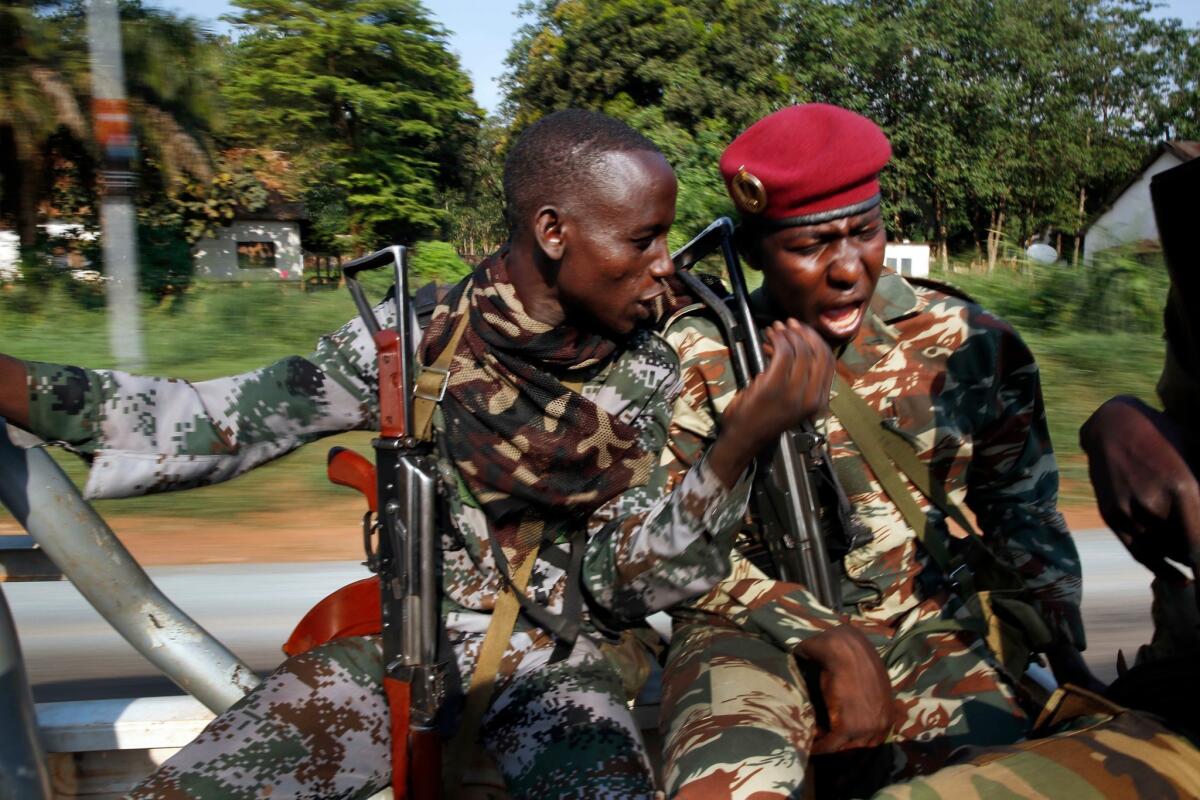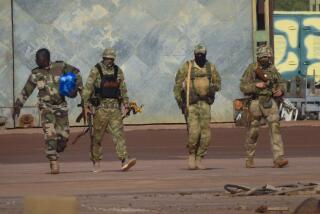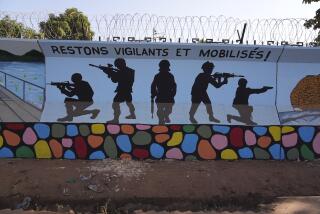Scores dead in Central African Republic; U.N. sending more troops

JOHANNESBURG, South Africa -- With dozens reported dead Thursday in clashes in the capital of the Central African Republic, the U.N. Security Council authorized the deployment of more French and African peacekeepers to contain the spiraling violence.
The unanimous French-sponsored Security Council resolution authorized additional peacekeepers mandated to use force to protect civilians. African forces in the Central African Republic are expected to increase from around 2,500 at present to 3,600 by year’s end; the French force is expected to expand from 600 to about 1,200.
The crisis in the Central African Republic has worsened sharply in recent months, with sectarian attacks between rival Christian and Muslim groups, and warnings the country could descend into sectarian warfare or genocide.
Fighting between rival militias broke out in the capital, Bangui, early Thursday, according to news agency reports, as the shock waves of a rebel coup in March continue to reverberate. Witnesses and aid workers counted at least 98 dead, the Associated Press reported, adding that an AP reporter counted 48 bodies in a mosque. There were other reports of bodies lying around the city.
The country, which has lurched from crisis to crisis since independence in 1960, slid into chaos after Seleka rebels ousted the president, Francois Bozize, in March. Seleka leader Michel Djotodia had himself declared interim president -- the first Muslim leader in a mainly Christian country -- and incorporated the rebels, many of them from Chad and Sudan, into the national army.
Heavy gunfire rang out across Bangui on Thursday as the predominantly Muslim ex-Seleka forces clashed with local defense groups, which are mainly Christian and are known as anti-balaka forces. Balaka means machete in the local language.
The head of Djotodia’s guard, Gen. Arda Hakouma, told the Reuters news agency that anti-balaka fighters armed with rifles, rocket launchers and machetes launched attacks in three parts of Bangui. The ex-Seleka forces had regained control of the capital by about lunchtime, according to news agency reports.
Human rights groups have reported that in recent months, the ex-Seleka forces have killed civilians, burned villages, raped girls and women and forcibly recruited child soldiers.
According to the United Nations, about 400,000 people, almost a tenth of the population, have fled towns and villages, many of them hiding in the bush.
Anti-balaka forces have also been accused of indiscriminate revenge killings. The U.N. reported Wednesday that anti-balaka forces launched an attack on Muslim herders, killing 12 and wounding at least 30, including children, in the northwest of the country.
In the north of the country, tensions are high with fears of reprisal killings after the attack on the herders and Thursday’s fighting in the capital.
The United States condemned Wednesday’s attack and called for an end to the violence.
“The United States is appalled by today’s reports of the murder of innocent women and children outside of Bangui. This horrifying account is the latest in a string of reports that illustrate the deteriorating humanitarian and security situation in the Central African Republic ... that could lead to an escalation in violence and further atrocities,” a State Department statement said.
On Thursday, the U.N. Security Council also imposed an arms embargo on the country. In addition, it called for an inquiry into human rights abuses in the conflict and for the consideration of a U.N. peacekeeping force, which could number up to 9,000.
The present African forces have been deployed by the Economic Community of Central African States, but the force is to be converted into an African Union force by the end of the year.
Humanitarian agencies warned of the need to swiftly deploy international forces in the capital to prevent further fighting.
“We’ve received numerous reports from very credible sources of extrajudicial executions,” an Amnesty International official, Joanne Mariner, told Reuters. “This underscores the need for international troops to arrive and secure the city. The situation is quickly spiraling out of control.”
ALSO:
Russian media deride Kerry visit to Moldova
Truck carrying dangerous radioactive material stolen in Mexico
Kerry opens Middle East trip discussing peace, Iran with Netanyahu
Twitter: @latimesdixon
More to Read
Start your day right
Sign up for Essential California for news, features and recommendations from the L.A. Times and beyond in your inbox six days a week.
You may occasionally receive promotional content from the Los Angeles Times.





